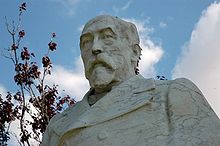Marià Aguiló i Fuster

Marià Aguiló i Fuster (born May 16, 1825 in Palma de Mallorca , † June 6, 1897 in Barcelona ) was a Mallorcan - Catalan poet, philologist and bibliographer. Aguiló was one of the founders and the central figure of the Catalan Renaixença , the movement in the 19th century that helped the Catalan language and culture regain its cultural status.
life and work
Aguiló came from a wealthy family in Palma. Even in his youth he was interested in Catalan culture. His first Catalan-language poems from this period were published posthumously in 1900 under the title Records de Jovenesa . They have echoes of the romantic folk poetry of the time. His few Spanish-language poems turned out to be provincial and never reached the height of the Catalan-language poems.
In 1844 he moved from Palma de Mallorca to Barcelona to study law . However, he never practiced the profession of lawyer. In Barcelona he came into contact with Pau Piferrer , Joaquim Rubió i Ors and other intellectuals, on whose recommendation he was employed as a librarian at the University Library of Barcelona. During these years he wrote a lot, published only a few and laid the basis for his bibliographical, linguistic and folk research of the entire Catalan-speaking cultural area, even the rest of the Iberian Peninsula and France . In 1849 he joined the Society of Archivists. In 1858 he was appointed librarian at the University of Valencia. Here he came into scientific contact with Vicent Wenceslau Querol and Teodor Llorente . During these years he developed the Bibliografia Catalana , a work that received an award in Madrid in 1860, but was not published until 1927.
In 1861 he returned to the University Library of Barcelona as Head of Unit (cat .: oficial primer). Ten years later he became the director of this university library. In the following years he actively participated as a poet in the Jocs Florals poetry competition. In 1866 he was appointed master of troubadour poetry. In 1862, 1873 and 1883 he was appointed patron of the Jocs Florals (cat .: mantenidor); In 1867 and 1888 he was president. He became a member of the Commission for the Spelling Reform of the Catalan Language. As its president, he gave important lectures on the Catalan language and Catalan poetry.
His poetic work was later compiled by his son Àngel and published in 1925 by Francesc Matheu in a three-volume complete edition ( Poesies completes ). In his poems, Aguiló brought high culture together with the popular culture of the time. He enriched his poems with conservative , religious and patriotic elements. Aguiló is considered one of the best romantic poets in the Catalan language. His poetry is characterized by a special balance and a special freshness in the language, which is concretized in the themes of "death", "nature" and "love". Aguiló published bibliophile editions of Catalan classics e.g. B. in the series Biblioteca Catalana (in collaboration with Miquel Victorià Amer, B. Muntaner and his son Àngel Aguiló) and the songbook collection Cançoneret de les obretes en nostra llengua materna més divulgades durant los segles XIV, XV e XVI (songbooks in Catalan 14th, 15th and 16th centuries). He documents and collected extensive material on popular poetry in the Catalan language, excerpts of which were published in the Romancer popular de la terra catalana of 1893. He has also compiled linguistic material on the Catalan language. This research culminated in the 8-volume dictionary Diccionari Aguiló , which was published from 1915 to 1934.
Aguiló was a member of the Acadèmia de Bones Lletres in Barcelona. Only today is his immense influence on the Catalan Renaixença fully recognized and appreciated. He is now considered the main figure in this cultural movement.
Works by Marià Aguiló i Fuster
- Romancer popular de la terra catalana (1893)
- Llibre de l'amor (1898)
- Llibre de la mort (1898)
- Records de jovenesa (1900)
literature
- Enciclopèdia Catalana: Aguiló i Fuster, Marià . In: Gran enciclopèdia catalana. 2nd edition 5th reprint 1992. Volume 1 . Enciclopèdia catalana, Barcelona 1987, ISBN 84-85194-82-9 , p. 288-289 (Catalan).
Web links
- Enciclopèdia.cat: Marià Aguiló i Fuster. Retrieved April 12, 2018 (Catalan).
Individual evidence
- ↑ The daily life data are taken from the corresponding Wikipedia article in Catalan.
| personal data | |
|---|---|
| SURNAME | Aguiló i Fuster, Marià |
| ALTERNATIVE NAMES | Aguiló, Marià |
| BRIEF DESCRIPTION | Catalan poet and philologist |
| DATE OF BIRTH | May 16, 1825 |
| PLACE OF BIRTH | Palma de Mallorca |
| DATE OF DEATH | June 6, 1897 |
| Place of death | Barcelona |
